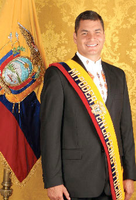Guayaquil (Equador), 1969
By Marcel Gomes
Politician from Ecuador who defines himself as a left-wing Christian, he assumed the presidency of Ecuador after winning the November 2006 elections. His victory over millionaire Álvaro Noboa occurred in the second round, when he obtained 56% of the votes. He was supported by a range of political groups and social movements, such as the Alianza Pátria Altiva y Soberana (PAIS), the Socialist Party–Broad Front (PS-FA), the Confederation of Indigenous Nationalities of Ecuador (CONAIE), and the Plurinational Unity Movement Pachakutik–New Country (MUPP-NP).
Like the presidents of Venezuela, Hugo Chávez, and Bolivia, Evo Morales, he holds a progressive discourse critical of the United States and neoliberalism. At the center of his government proposal is the realization of a Constituent Assembly. He advocates for the country to benefit more from income derived from oil exploitation and has suspended negotiations for a bilateral free trade agreement with the United States.
However, the dollarization of Ecuador’s economy should not be reversed, as, according to Correa, the cost would be too high. Between April and August 2005, he served as Minister of Economy and Finance but resigned due to disagreements with President Alfredo Palacio over the sale of the country’s external debt bonds to Venezuela. An economist by training, he studied at the Catholic University of Santiago de Guayaquil and earned a doctorate in the United States. He speaks Spanish, French, and English fluently but admits to being a beginner in Quechua, the main language of Ecuador’s indigenous peoples, who make up 25% of the national population. He played an important role in the student movement and reached the presidency of the Federation of Private University Students of Ecuador (FEUPE) in 1986. He has worked as a consultant for public and private companies and associations. A scholar of Ecuadorian economics, he has published books discussing proposals to stimulate job creation and combat poverty.




